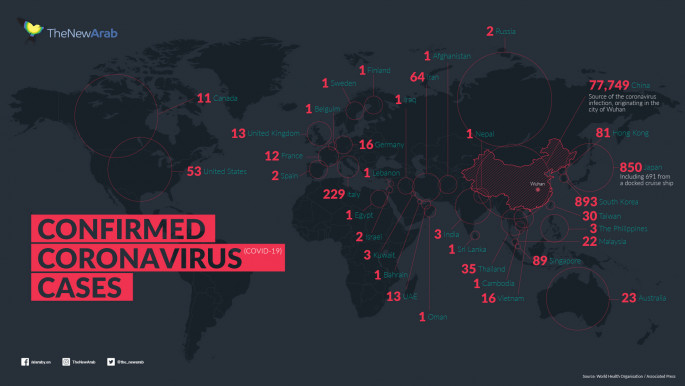Kuwait, Bahrain announce first coronavirus cases as Iran death toll climbs
Kuwait reported three infections and Bahrain one.
"Tests conducted on those coming from the Iranian holy city of Mashhad showed there were three confirmed cases of the coronavirus (COVID-19)," the Kuwaiti health ministry said in a statement posted on Twitter.
It said the cases were of a 53-year-old Kuwaiti man, a 61-year-old Saudi citizen and a 21-year-old stateless Arab, known as "Bidoon".
"All three cases are under constant observation by the health authority," the ministry added.
Bahrain's health ministry also reported the country's first COVID-19 case on Monday after a "citizen arriving from Iran was suspected of having contracted the virus based on emerging symptoms".
The patient was transferred to a medical centre for "immediate testing", which proved positive for the infection, the ministry added.
Read also: Iran says 'enemies' used coronavirus to sabotage election as death to rises
The confirmed cases came as Iran's semi-official ILNA news agency said the death toll rose to 50 in Qom on Monday, the highest outside of China where the virus originated.
Meanwhile, authorities in Tehran maintained an earlier death toll of 12, though it pledged to be transparent with its figures on the deadly outbreak in the country.
"We will announce any figures (we have) on the number of deaths throughout the country. We pledge to be transparent about the reporting of figures," government spokesman Ali Rabiei said in a news conference aired live on state television.
Iran's outbreak prompted travel bans from nearby countries on Sunday, with Turkey and Pakistan closing their borders to the Islamic Republic.
Last week, Kuwait banned entry of all ships from Iran and suspended flights to and from the country.
Kuwait had also banned non-citizens coming from Iran from entering the Gulf state and operated chartered flights to bring back hundreds of Kuwaiti Shia pilgrims from the country.
Twitter Post
|
Around a third of Kuwait's 1.4 million citizens are Shia Muslims, who travel regularly to Iran and Iraq to visit religious shrines. Kuwait also hosts roughly 50,000 Iranian workers.
Over half of Bahrain's population of under one million are Shia, who also travel frequently to Iran and Iraq.
Iraq said it closed the only border crossing with Kuwait at Safwan, south of Basra, late on Sunday.
Neighbouring UAE has already announced 13 cases of the novel coronavirus, all of them foreigners.
The latest were a 70-year-old Iranian man, whose condition is unstable, and his 64-year-old wife.
Three Chinese nationals were treated for COVID-19 and have been discharged from UAE hospitals.
UAE airlines have suspended most flights to China - where the virus first emerged in December - except to the capital Beijing, but have not yet taken any measures to restrict travel to and from Iran. Around half a million Iranians live and work in the UAE.
Read also: 'No reason to panic!': Meet the Lebanese student video blogging from Wuhan, coronavirus' ground zero
Three Gulf states - Saudi Arabia, Oman and Qatar - remain free of the virus, but all have suspended flights to China.
Qatar Airways said on Monday it will quarantine people arriving from Iran and South Korea, the biggest hotspot outside of China, for 14 days.
China's death toll from COVID-19 rose to nearly 2,600 on Monday. The virus has spread to more than 25 countries and is causing mounting alarm due to new outbreaks in Europe, the Middle East and Asia.
Follow us on Facebook, Twitter and Instagram to stay connected





 Follow the Middle East's top stories in English at The New Arab on Google News
Follow the Middle East's top stories in English at The New Arab on Google News
![Israeli forces ordered bombed Gaza's Jabalia, ordering residents to leave [Getty]](/sites/default/files/styles/image_330x185/public/2176418030.jpeg?h=a5f2f23a&itok=_YGZaP1z)

